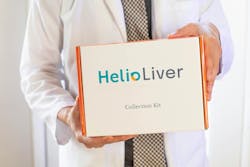Helio Genomics HelioLiver Dx Test outperforms ultrasound in early liver cancer detection
Helio Genomics has released results from their latest clinical trial demonstrating the performance of their HelioLiver Dx test compared to ultrasound.
Dr. Richard Van Etten, Helios Chief Medical Advisor, presented data from the Companys pivotal Clinical Trial (CLiMB) study, entitled "A prospective, blinded, multicenter U.S. evaluation of a multi-analyte blood-based test for the detection of hepatocellular carcinoma (HCC) in patients with cirrhosis."
Data Highlights:
- HelioLiver Dx is a multi-analyte blood-based test employing a proprietary algorithm that utilizes a wide array of biomarkers such as cell-free DNA (cfDNA) methylation, serum proteins and patient demographic information to accurately detect HCC in cirrhotic patients.
- 1,968 adult patients with cirrhosis were enrolled across the U.S., of which 1,556 participants made up the validation cohort, with 1,268 evaluable patients.
* 46 participants (3.6%) had HCC, confirmed by MRI:
- 80% lesions = 4 cm
- 46% lesions < 2cm
- 59% T1 stage lesions according to the TNM staging system
- The HelioLiver Dx test met the prespecified coprimary endpoints - Overall superior sensitivity (> 5%) and non-inferior specificity (> -10%) compared to ultrasound for detecting HCC lesions.
- The HelioLiver Dx test met the prespecified secondary endpoint - Superior sensitivity compared to ultrasound for detecting HCC lesions = 4 cm in diameter.
- HelioLiver Dx outperformed ultrasound for sensitivity to detect HCC lesions in cirrhotic patients:
* All HCC lesions: 47.8% for HelioLiver Dx vs. 28.3% for ultrasound
* HCC lesions = 4 cm: 37.8% for HelioLiver Dx vs. 13.5% for ultrasound
* HCC lesions < 2 cm: 28.6% for HelioLiver Dx vs. 0% for ultrasound. Notably, ultrasound failed to detect any lesions < 2 cm in the CLiMB study.
* T1 HCC lesions: 44.4% for HelioLiver Dx vs. 11.1% for ultrasound

